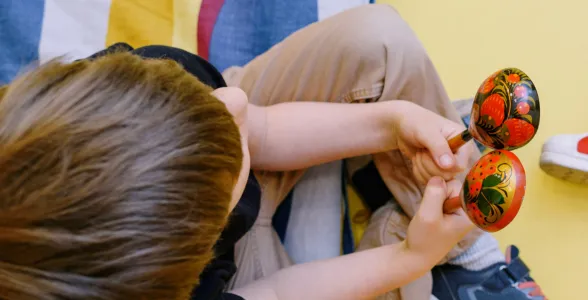
World Prematurity Day
World Prematurity Day (17th November) is a global movement to raise awareness of premature birth and the sometimes devastating impact it can have on families. For every 13 babies born in the UK, one baby is born premature.
Although music therapy in neonatal intensive care environments is becoming more commonplace in both the United States and Australia, it is a more recent area of work in the UK. The NICU-MT certification is only provided following completion of training by The National Institute for Infant & Child Medical Music Therapy (USA).
Our Music Therapist, Emma shares what it's like working on a NICU ward:
"When in the NICU as a Music Therapist, I have to remain flexible with the current treatment, age and condition of the baby, as well as working alongside feeding, skin to skin and sleeping. If a baby is of a younger gestational age, or perhaps still in an incubator, I offer a technique to help infants develop and build up their tolerance of external stimulus, the environment and handling. By layering positive auditory sounds, singing and ukulele sounds, alongside touch and visual stimuli this can help settle and improve their ability to manage the new environment around them, which perhaps they’re not quite ready for.
Breastfeeding isn’t always easy for mothers or the baby, so offering a conversation as well as musical sounds and lullaby singing can help to calm both mother and baby, and help to support breastfeeding. Sometimes offering singing and sounds can help to stimulate the baby and motivate sucking.
Music therapy can also help to build a connection and bond with your baby. The baby will already be attuned to the mother’s voice, but singing may be a new experience. Skin to skin moments can be a great time to introduce singing and musical sounds, adding another layer of connection, stimulation, and positive experience in your baby's new world.
Each neonatal experience will affect families differently, and it's important we raise awareness about the hurdles babies and parents face, and overcome, every single day."
What benefits does Music Therapy provide for preterm infants?
- Improved neurologic growth and development
- Regulation of heart rate, respiration and oxygen saturation levels
- Reduced stress and pain
- Increased ability for bonding between caregiver and infant
- Shortened length of stay
- Improved educational and therapeutic services for parents
- Improved non-nutritive and nutritive sucking endurance and effectiveness
- Improved level of care for patients and improved specialist skill set of staff
What approaches do we use?
.webp)
- Developmental Multimodal Technique (based on auditory, tactile, visual and vestibular interventions) The music therapist or caregiver layers simple singing of lullabies for example (auditory), followed by gentle massage (tactile). The visual element is the music therapist or caregiver carrying out the technique and the vestibular element is a final gentle rocking. If there is any sign of overstimulation the session is layered back or is stopped. Overall, the longest length of this type of session is approximately twenty minutes. It is suggested the infant is 30-32 weeks GA for this technique.
- Music combined with kangaroo care
- Sustained Music/Live singing to the infant (supporting arousal and stimulation, option to support and encourage feeding / sucking)
- Parent / caregiver therapeutic support
- Joint working with AHP’s and nurses
- Personalised lullaby song writing (parental support)
Lullabies for your baby

We have put together a lullaby playlist on Spotify, which you can use to soothe your baby. It’s also a collaborative playlist, so you can add your very own lullaby. Perhaps a favourite from your own childhood or the one your baby has responded to most.
Support our Work
Help us to provide Music Therapy to the most vulnerable and isolated members of our society
Donate here

.webp)

.png)
.webp)